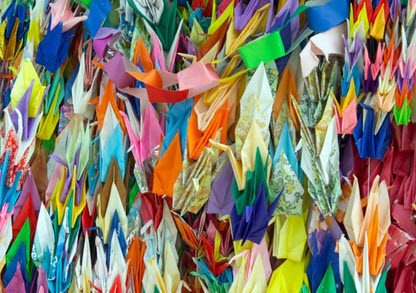Message from FCNL on the anniversary of the
US bomb attack of Hiroshima and Nagasaki

This week marks the 76th anniversary of the atomic bomb attack on Hiroshima (Aug. 6) and Nagasaki (Aug. 9). As we remember the horrors of these attacks, it is essential that we continue to work to ensure nothing like this ever happens again. We join #CranesforOurFutre in marking this anniversary and affirming our vision for a world without war and the threat of war.
Below is an excerpt from a reflection by FCNL’s Allen Hester. (Read the full piece here.) In it, Allen shares the story of an A-bomb survivor named Kunihiko Bonkohara and reflects on his own childhood spent in Cheyenne, Wyoming, only a few miles from Warren Air Force Base. It is one of the largest missile-command bases in the nation.
“If a nuclear war were to break out between the United States and another nuclear armed state, there is no doubt that my hometown—where my mother, father, and sister still live—would be a target,” he writes. Allen continues:
“In a new era of strategic competition and tension, we must do everything we can to avoid going down the same path that led to Kunihiko’s horrifying experience. Yet tensions continue to rachet up, and too many policymakers seem to believe that war with Russia or China is inevitable. It is not. War is always a choice, and it is one that we cannot afford to make.
“President Joe Biden has said he intends to reduce the role of nuclear weapons in national security strategy. He and Russian President Vladimir Putin have reaffirmed Ronald Reagan’s dictum that nuclear war can never be won and must never be fought, and they have begun arms control talks to build upon previous agreements. These developments offer hope that the United States can reach agreements with even its staunchest adversaries, pulling back from the brink of war and breaking the cycles of mistrust.
“We must hold our elected leaders accountable to their commitments and make it clear that the world does not need more nuclear weapons. Our massive existing stockpile, which includes nearly 6,000 nuclear warheads, has only increased the risk of catastrophe, whether by miscalculation, miscommunication, or choice.”